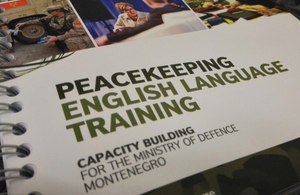Continuation of Peacekeeping English Language Training in Montenegro
More info on how UK Ministry of Defence, together with Ministries of Defence of Kingdom of the Netherlands and the Kingdom of Norway, helps Ministry of Defence of the Montenegro.

“Peacekeeping English Language Training” (PELT) is a programme designed to develop a sustainable system and structure of English language training for the Ministry of Defence Montenegro, including by strengthening their internal capacities for continuous English language training.
As an international language, English is a major prerequisite in enabling Montenegro’s Ministry of Defence to take an even greater role in international activities. This enhances interoperability along the path towards NATO membership, one of the Montenegrin government’s top strategic priorities.. The PELT project has therefore played an important role at a critical time in supporting the Ministry of Defence’s development.
In the year 2014/15, the PELT project has included the following activities:
Teacher Training Programme
This programme increases the teaching capacities of Montenegro Armed Forces English teachers through an intensive training programme, expanding the team of highly qualified English teachers in the Ministry. Three intensive training courses for MOD teachers were organised in 2014/2015:
- Teaching with Technology,
- Test Design and
- Course Design: Study paths for Self-Study.
Intensive English Courses
A 12-week intensive course for 15 beginners was organised from December to March in Pljevlja, in the north of Montenegro. This is a step forward towards getting peripheral locations to organise active training. Besides Pljevlja, two more training centres had intensive English courses from March until June in 2015: the Navy in Bar (on the coast) and the Air Force in Golubovci, near Podgorica capital.
Online courses
In order to speed up the learning process and encourage continued self-development, “Learn English Pathways” is introduced, online courses offering English in four levels, from A1 (beginner) to B2 (upper intermediate). The online element means these courses can be accessed from work or from home, enabling the learner to combine study more readily with professional and family duties. Courses can last between 60-90 hours, and include regular tests. Priority candidates, military staff members who are on top of the list to improve English due to professional needs, can combine combining online courses with face-to-face courses to accelerate learning. Fifty six candidates will obtain a license for this course during the year.
Specialist Short Courses
In addition to general courses, the academic calendar of PELT offers a range of specialist courses for language use in specific professional settings. In the last six months, four short courses were organised in “Formal correspondence and Presentation skills” (held in February) and “Effective negotiations and Effective meeting” (held in March and April 2015). Forty seven staff members from MOD participated.
One–to-one tuition
Four senior officials have attended 16 weeks of tailor-made individual English lessons. These lessons helped current and future Armed Forces and MOD officials do their jobs better as a result. The training was looking at strengthening speaking and listening skills in a variety of professional situations.
Quality assurance
The programme is also developing a comprehensive database of all personnel, including their learning history and further needs. This will support continuous professional development of English sills across different departments.
The main library and IT classrooms are equipped with new collections of course books, teaching resources and multi-media learning materials.
MoD instructors have produced customised curricula for A1-B2 levels, developing targeted, relevant and realistic scenarios and materials to deepen the value of the course offerings and learning outcomes for their language students.